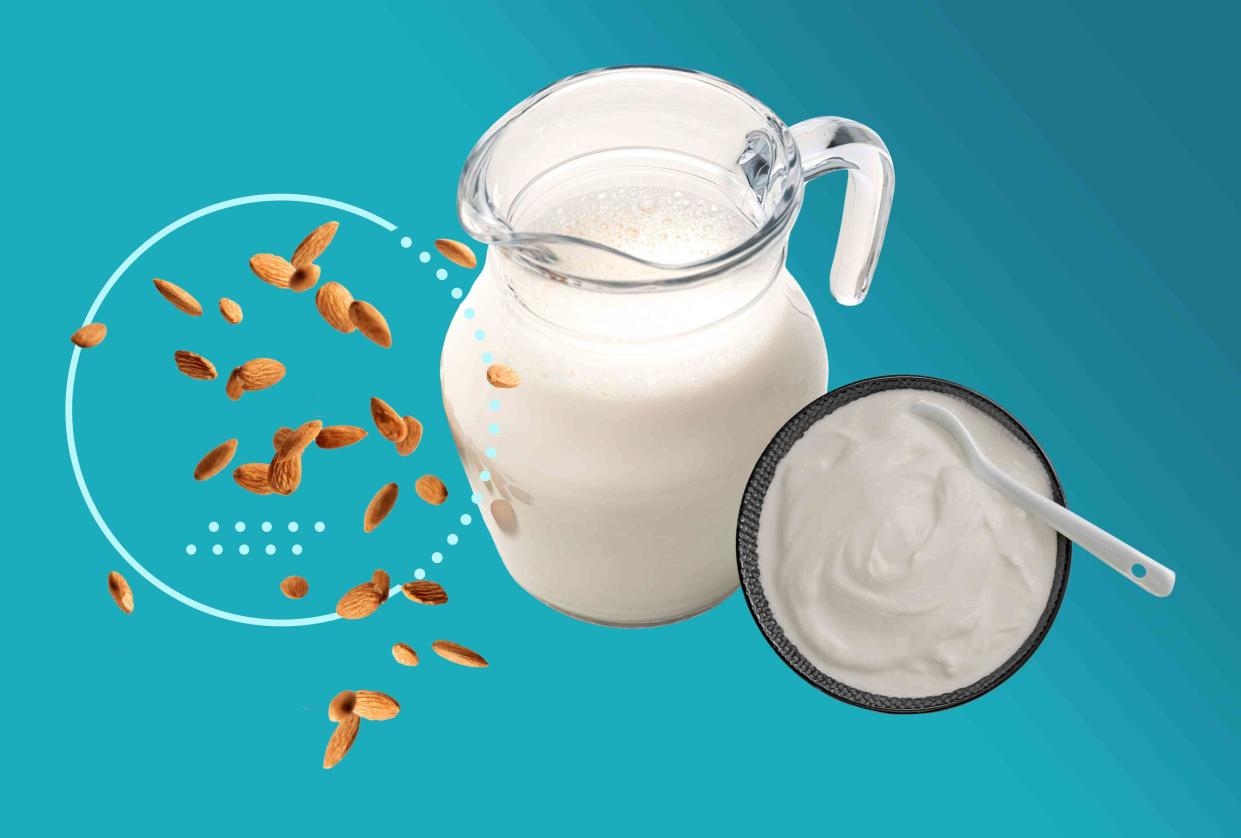Why You Should Give Almond Milk Yogurt a Try

Fact checked by Nick Blackmer
Key Takeaways
A new study compared the nutrient profiles of 600 plant-based and dairy yogurts.
Almond and oat yogurts were the most similar to dairy milk yogurts.
Plant-based yogurts in general have less protein, calcium, and potassium than dairy yogurts, but they're also lower in sugar and sodium and provide more fiber.
There are now a variety of plant-based yogurts made from almonds, coconut, oat, and cashew. How do you know which non-dairy yogurt is the right choice for you? It depends on what you want to get out of your product.
Oat and almond milk yogurts seem to be the most comparable to dairy milk yogurts in terms of energy and nutrient density, according to a new study published in the journal Frontiers in Nutrition.
The same study found that plant-based yogurts in general contain less protein, calcium, and potassium than traditional dairy options. But plant-based yogurts typically have less sugar and sodium and provide more fiber than dairy yogurts.
“There’s a lot of confusion among consumers. Is it healthy? Is it not healthy? Even within plant-based, there’s a lot of variability,” said Alissa A. Nolden, PhD, a co-author of the study and assistant professor in food science at the University of Massachusetts, Amherst.
Related: Eating Yogurt May Reduce Your Colorectal Cancer Risk, Research Shows
The researchers used a tool called the Nutrient Rich Foods (NRF) Index to compare the nutrient profiles of more than 600 different yogurts available in the United States. This tool assigns a score to each yogurt, which helps rank the products based on nutrient density.
The yogurts were ranked based on nutrient density in the following order: almond, oat, low and nonfat dairy, full-fat dairy, cashew, and coconut.
Instead of finding “the best” plant-based yogurt, the researchers aimed to compare the nutrition profiles of hundreds of yogurt products. For the study, they only focused on sugar, sodium, fiber, saturated fat, calcium, protein, iron, potassium, and vitamin D.
“If we had selected different nutrients, we would see different results, so to say something is more nutritious is a little bit outside of the objective of the study,” Nolden said. “But if you are trying to find a complete replicant of the nutritional profile of dairy yogurt, oat and almond would be good options.”
Related: Is Pea Milk the Superior Plant-based Milk?
How to Choose the Right Yogurt
Some people consume dairy yogurt for probiotics, which are thought to offer immunity-boosting gut health benefits. A 2021 study published in Nutrients found that plant-based yogurts, like their dairy counterpart, contain a variety of probiotic cultures. Even though probiotics might not survive as well in plant-based yogurts, the probiotics from these fermented products may still be able to support the gut microbiome.
Like dairy yogurts, plant-based yogurts are also created by using "good bacteria" during fermentation, according to Colleen Tewksbury, PhD, MPH, RD, an assistant professor in nutrition science at the University of Pennsylvania School of Nursing.
"The type of bacteria used and the amount will impact the flavor of the product," Tewksbury told Verywell. "Each may have a different potential benefit for gut health, but overall, most people in the U.S. do not consume much in the way of probiotics. So any additional intake could be potentially helpful for most."
Related: Should You Be Taking Postbiotics? Here's What You Need To Know
In the latest study, coconut yogurt was ranked the lowest according to the NFR Index, likely because it contains low amounts of protein and high amounts of saturated fat.
Although almond and oat yogurts ranked the highest in the study, that doesn’t mean these are the only options people should consider when making a dairy-aisle decision.
“Food is really tied up in emotions, and there’s nothing inherently bad about specific yogurts,” Tewksbury said.
Price, sustainability issues, health concerns, and taste preferences can all come into play when yogurt is on the grocery list, so this type of study can’t be used to show the best yogurt for everyone.
For someone who wants to avoid animal products, plant-based yogurts would be the only option. But if someone is concerned about protein intake, they might want to be aware that plant-based yogurts typically contain less of this macronutrient than the dairy versions.
While this study shouldn’t be used to guide all yogurt-based decisions, you might want to spend more time looking at the nutrition label of your go-to yogurt to have a better idea of the nutrient composition.
“These products might not contain the same nutrient profile as their conventional product, even though they’re marketed as being a replacement or a substitute,” Nolden said.
Read Next: Study: Probiotic Supplement May Prevent Antibiotic-Associated Diarrhea
What This Means For You
There isn’t one type of yogurt that is best for everyone. If you want to incorporate more plant-based yogurt into your diet, consider your individual health goals and look for a product that meets your needs.

